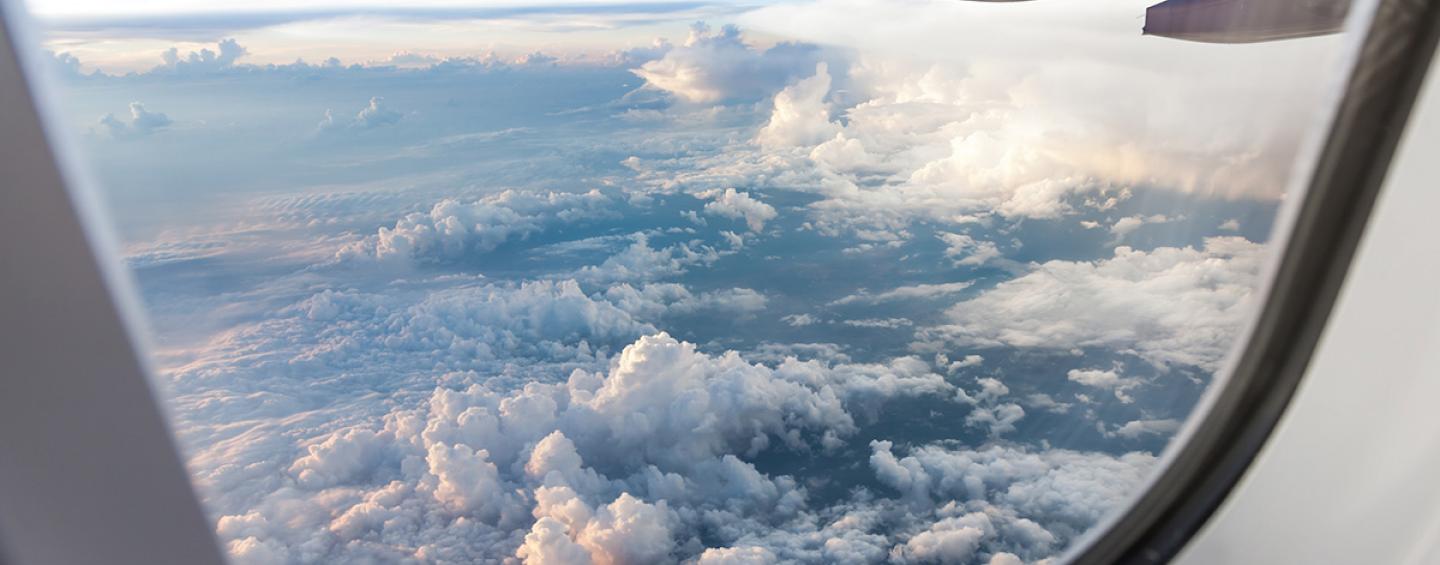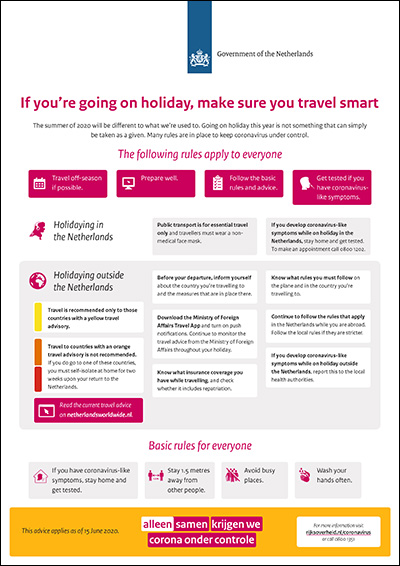
Travel advice - what to expect in the coming weeks
updated: 2 July
As of 1 July, the government have lifted the travel ban on some countries outside of the EU/Schengen zone.
Following are the latest changes on travel restrictions:
- Entry ban is lifted for residents of Algeria, Australia, Canada, Georgia, Japan, Montenegro, Morocco, New Zealand, Rwanda, Serbia, South Korea, Thailand, Tunisia, Uruguay and China. Residents of China are only allowed to enter the Netherlands if China opens its borders to EU citizens. Visa services at embassies/consulates will resume for the countries listed above.
- Highly-skilled migrants and students are exempted from travel restrictions (if work cannot be done remotely or postponed). They can request an MVV to travel to the Netherlands if they are able to provide a prove of their flight and the urgency for their travel. Highly-skilled migrants from visa exempt countries can enter the Netherlands as before.
- Travellers from high-risk areas are strongly advised by the Dutch government to self-quarantine for 14 days. EASA, the European Union Aviation Safety Agency maintains a list of airports in high-risk areas. Highly-skilled migrants and students from high-risk areas (e.g. USA, Brazil, Russia, and India) may request to travel to the Netherlands, but they will be required to self-quarantine upon arrival.
- Travellers need to fill in a health screening form and pass a health check (no testing necessary) before boarding a flight. Passengers will receive a health screening form from the airline before boarding. They can also download the form online.
- It is mandatory for passengers to put on a non-medical face mask on a flight, at check-in, border control and security.
- Travellers will be informed about the Dutch measures at airports, train stations, and other channels.
- Lifting of the entry ban does not necessarily result in a change of the Dutch travel advice to those countries. This depends on the quarantine rules and local measures on Dutch visitors. Most countries will continue to have a red or orange travel advice. Please refer to the explanation of colour codes below.
updated: 11 June
The Dutch government will be lifting travel restrictions to some countries this summer. However, travellers are advised to prepare well and travel smart.
From 15 June it will be possible to travel within the EU/Schengen zone (except Denmark, the United Kingdom and Sweden). The travel advice for these countries will be adjusted from orange (holiday travel not recommended) to yellow (holiday travel possible – but be aware of risks). Please refer to the explanation of colour codes below.
Following are expectations for the coming weeks:
- As of 15 June, it will be possible to travel to the following countries, but be aware of risks:
Belgium, Bulgaria, Germany, Estonia, Iceland, Italy, Croatia, Latvia, Lithuania, Luxembourg, Portugal, Slovenia, Czech Republic, Switzerland. - Travel to United Kingdom* and Sweden* is not recommended.
- More updates from the following countries will be expected in the coming weeks:
France, Austria, Spain, Liechtenstein, Cyprus, Finland, Greece, Hungary, Ireland, Malta, Norway, Poland, Romania, Slovakia, the Caribbean part of the Kingdom. - Visit nederlandwereldwijd.nl (in Dutch) for the latest update.
- Travel to countries outside of EU/Schengen is not recommended (until 30 June).*
- From 1 July a list of non-EU countries for which travel restrictions can be lifted should be made available.
- Those travelling to study, as well as highly skilled non-EU workers should be exempt from travel restrictions if their employment is necessary from an economic perspective and the work cannot be postponed or performed abroad.
- EU citizens and citizens of Schengen Associated States and non-EU nationals legally residing in the EU, as well as their family members should also be exempt from the travel restriction regardless of whether or not they are returning home, as was the case until now.
*If you do go to these countries for a necessary trip, you will need to complete a mandatory health screening form and self-quarantine for 14 days on your return to the Netherlands.
Holiday within the Netherlands
Holiday parks and campsites in the Netherlands are scheduled to reopen completely on 1 July. However, the primary coronavirus measures still apply. Please refer to this infographic for holidaymakers on guidelines in the Netherlands.
Since 1 June, public transport has resumed regular schedules, but this should be used for essential journeys only. Travelling by car, bike or on foot is advisable. It is also mandatory now for passengers (aged 13 and over) to wear a non-medical face mask while travelling.
Explanation of colour codes for travel advice
The travel advice consists of four colour codes: green, yellow, orange and red. Usually, they indicate the security situation in a country. Currently, these colour codes also apply to countries with the coronavirus and this is what they mean:
Green: There are currently no coronavirus measures in the country or region that will affect your trip or stay. You will be able to travel freely to these countries.
Yellow: In connection with coronavirus, these countries have taken measures that have a limited impact on everyday life. You may be able to travel to these countries, but be aware of risks.
Orange: Daily life is disrupted in these countries. There may also be an entry ban. Travel to these countries is not recommended. Travellers returning from a country with code orange will be required to self-quarantine for 14 days.
Red: This country or area is completely closed. There is no possibility of entry and exit.
Internationals who are citizens of a high-risk country may return to their home country, but a mandatory 14 day self- quarantine applies on your return to the Netherlands.
For the latest travel advice
Please visit nederlandwereldwijd.nl (in Dutch) or
Download the Travel App from the Ministry of Foreign Affairs:
- Travel app Foreign Affairs for Android
- Travel app Foreign Affairs for iOS (iPhone and iPad)
You can also refer to netherlandsworldwide.nl for answers to frequently asked questions,
the Immigration and Naturalisation Service (IND) about your residence documents, and
European Union Aviation Safety Agency EASA for the latest list of airports in high-risk coronavirus areas.
Download this infographic to prepare yourself when going on vacation in the Netherlands and abroad.
